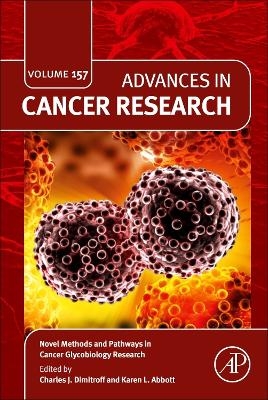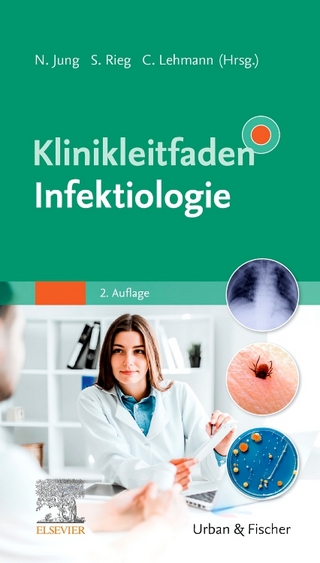
Novel Methods and Pathways in Cancer Glycobiology Research
Academic Press Inc (Verlag)
978-0-323-99177-3 (ISBN)
The main goals of these research efforts are: 1. To identify and study how cancer-associated glycans functionally impact cancer growth and metastasis 2. To identify cancer-associated glycans that can serve as biomarkers for the detection or progression of cancer 3. To develop cancer-associated glycans as novel therapeutic targets for the treatment and cure of cancer
This volume consists of (9) chapters, one from each funded laboratory, that reviews new methods and mechanisms highlighting glycoconjugates and their roles as cancer biomarkers and/or anti-cancer therapeutic targets.
Over the last 26 years, Dr. Dimitroff has established himself as leader in field of glycobiology and is highly motivated to translate his glycobiological findings to help cure diseases and improve the health of humans. His research focuses on understanding how sugars or ‘glycans’ regulate immune and cancer cell functions with the goal of developing new approaches to boost the immune system to fight diseases and to treat cancer progression. These efforts have led to a laboratory that operates one of the preeminent translational glycobiology programs in the US. Dr. Dimitroff spent his initial years as an independent PI at Brigham and Women’s Hospital (BWH)/Harvard Medical School (HMS) transitioning from Instructor to Associate Professor of Dermatology in the Department of Dermatology. He was a Faculty Member in the Harvard Immunology Ph.D. Program and was the Associate Director for Laboratory Research in BWH Dermatology. In 2019, he then joined the Herbert Wertheim College of Medicine (HWCOM) at Florida International University (FIU) as the Executive Associate Dean for Research and Professor (with Tenure) of Translational Medicine. He now has concentrated his administrative duties focusing as the Founding Director of the Translational Glycobiology Institute at FIU (TGIF), wherein he oversees translational glycoscience research. The TGIF is a one-of-kind institute with translational glycoscience investigators seeking cures for diseases and providing research opportunities for trainees at all academic levels with a special focus on underrepresented minorities and women in science. Dr. Dimitroff’s current translational glycobiology research is subdivided into (2) Programs: a Solid Cancer Research Program and an Immune Research Program. In the Solid Cancer Research Program, his research explores the glycome of metastatic melanomas and ascertains how the glycome drives melanoma metastasis and whether these glycobiological features can be used as biomarkers to predict melanoma metastasis. In the Immune Research Program, his research investigates how human B cell glycans control B cell fate and function. These investigations have unveiled new molecular insights on the regulation of a humoral immune response and vaccinations, and the treatment of B cell malignancies. Dr. Karen Abbott has been a leader in the field of glycoproteomics and biomarker discovery for over 14 years. Dr. Abbott received her PhD in Biochemistry at The University of Georgia in 2004. She was awarded an American Cancer Society Postdoctoral Fellowship in 2005 where she developed lectin capture methods for the analysis of glycoproteins from human tissues and plasma using mass spectrometry methods. She has been funded for ovarian cancer research by since 2010. She is currently funded by an Alliance of Glycobiologists NCI grant to understand how complex carbohydrates contribute to the development and progression of ovarian cancer. She is also currently funded by the NCI Innovative Molecular Analysis Technologies grant that supports the development of novel and transformative technologies to develop new therapeutics and diagnostics for cancer. Dr. Abbott joined the Herbert Wertheim College of Medicine (HWCOM) at Florida International University in 2020 as Associate Director for the Translational Glycobiology Institute. Her research is currently focused in three main areas: translational therapeutic development for ovarian cancer, studies on the role of Notch glycosylation in ovarian cancer progression, and technology development for the study of glycosylphosphatidylinositol anchored proteins.
1. The clinical role of glycobiology on ovarian cancer progression
Rhyisa Armbrister, Laura Ochoa, and Karen L. Abbott
2. Mass spectrometry based biomarkers for early detection of HCC using a glycoproteomic approach
Yehia Mechref, Wenjing Peng, Sakshi Gautam, Parisa Ahmadi, Yu Lin, Jianhui Zhu, Jie Zhang, Suyu Liu, Amit G. Singal, Neehar D. Parikh, and David M. Lubman
3. Beyond glyco-proteomics—Understanding the role of genetics in cancer biomarkers
Andrew DelaCourt, and Anand Mehta
4. Measuring the multifaceted roles of mucin-domain glycoproteins in cancer
Nicholas M. Riley, Ru M. Wen, Carolyn R. Bertozzi, James D. Brooks, and Sharon J. Pitteri
5. Role of tumor cell sialylation in pancreatic cancer progression
Michael P. Marciel, Barnita Haldar, Jihye Hwang, Nikita Bhalerao, and Susan L. Bellis
6. The pleiotropic role of galectin-3 in melanoma progression: Unraveling the enigma
Norhan B.B. Mohammed, Aristotelis Antonopoulos, Anne Dell, Stuart M. Haslam, and Charles J. Dimitroff
7. Role of O-GlcNAcylation on cancer stem cells: Connecting nutrient sensing to cell plasticity
Giang Le Minh, and Mauricio J. Reginato
8. The biology of E-selectin ligands in leukemogenesis
Evan Ales, and Robert Sackstein
9. Heparan sulfate proteoglycans in cancer: Pathogenesis and therapeutic potential
Hua Yang, and Lianchun Wang
| Erscheinungsdatum | 06.02.2023 |
|---|---|
| Reihe/Serie | Advances in Cancer Research |
| Verlagsort | Oxford |
| Sprache | englisch |
| Maße | 152 x 229 mm |
| Gewicht | 630 g |
| Themenwelt | Studium ► Querschnittsbereiche ► Infektiologie / Immunologie |
| Naturwissenschaften ► Biologie ► Genetik / Molekularbiologie | |
| Naturwissenschaften ► Biologie ► Zellbiologie | |
| ISBN-10 | 0-323-99177-7 / 0323991777 |
| ISBN-13 | 978-0-323-99177-3 / 9780323991773 |
| Zustand | Neuware |
| Informationen gemäß Produktsicherheitsverordnung (GPSR) | |
| Haben Sie eine Frage zum Produkt? |
aus dem Bereich


